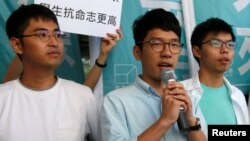The Hong Kong government on Wednesday failed in its bid to imprison three of the most prominent students at the center of the 79-day pro-democracy movement that paralyzed the territory’s commercial center in 2014.
Magistrate June Cheung Tin-ngan, who originally heard the case, had previously ordered the trio – Joshua Wong, Alex Chow and Nathan Law - to perform community service in lieu of jail terms, citing their youthfulness and motives.
Hong Kong Chief Executive unhappy with lack of jail time
But her reasoning and verdict failed to satisfy the administration of Hong Kong Chief Executive C.Y. Leung, which had taken a hard line against the Umbrella Movement and viewed the punishment as far too lenient.
Justice Department lawyers were sent back before Magistrate Cheung to ask for immediate jail sentences. Their argument, heard in a packed courtroom at Eastern District Court, turned mainly on the large number of people involved in the protests, the number of security officers injured (about 10), the premeditated nature of the three organizers’ actions and their lack of remorse. They faced an assortment of charges relating to incitement and unlawful assembly.
But, as the magistrate herself pointed out in rejecting the government’s request, no new evidence was presented to show that jailing was preferable to community service for such offenses.
Unusual procedure
Law professor Michael Davis of Hong Kong University said that seeking to have any magistrate reverse a determination is unusual.
“A judge overturning herself is sure to be rare,” he said in an online interview with VOA. “But in this case, where sensitive free speech rights are at stake, common law judges are rarely inclined to order a stiff sentence, being mindful of the chilling effect on free speech."
“There was no evidence that these defendants were engaged in self-serving acts, so under the (Hong Kong) Bill of Rights a judge will be mindful of their political speech objectives,” he said.
Pressure from Beijing?
“My guess is, the government is reacting to pressure from Beijing, either direct or implicit, to crack down on local activists. I would add that, generally such (a) hard line is counterproductive, just ratcheting up the resistance (that) Beijing wants to control,” Davis said when asked why the government even tried to get jail time for the protest ringleaders.
In this year's legislative elections, young localist candidates supporting greater autonomy for Hong Kong won four seats in the 70-seat chamber. And a close sympathizer, Eddie Chu Hoi-dick, became the largest single vote-getter in Hong Kong running on land and housing issues in the rural New Territories.
The latest survey on Hong Kong Executive C.Y. Leung’s popularity by the Public Opinion Program at the University of Hong Kong, reported on Sept. 13, shows him dropping significantly to very nearly his all-time low, and well below the popularity of his other senior ministers. Sixty-four percent of respondents disapproved of his performance and only 18 per cent were in favor.
Reflection on what happened
After the court session on Wednesday, the three youths, who had escaped jail time, stood on the steps of the Eastern District Court, built during the latter decades of British colonial rule, and each acknowledged supporters, expressed gratitude for the judiciary’s independence and answered questions from the local and overseas press. They spoke of “guardians” watching over the people’s liberties in Hong Kong
One of the three, Alex Chow, took a moment to reflect on the implications of what they were going through. “I think our case has set an example that there’s nothing wrong with civil disobedience,” he told VOA. “You can see that those who engage in civil disobedience get a great support from the public, from the Hong Kong people, and this reflects that if you are on the right side, and you are proposing the right thing, then it would not harm your future. It will only gain you more because, well, fighting for the public also benefits your own interests.”




